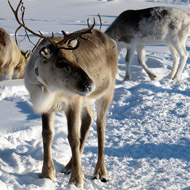
BVA and Veterinary Deer Society launch festive quiz
Looking for something to do with the family this Christmas? Then why not give the BVA’s festive challenge a try!
Launched in collaboration with the Veterinary Deer Society (VDS), the “Who ‘nose’ the real facts about Rudolph quiz’ will reveal how much we really know about Santa's red-nosed helper.
Like all animals in the UK, reindeer are safeguarded by the Animal Welfare Acts, which outline the five welfare needs that an animal keeper must provide by law.
For reindeer, which have specific welfare needs, this includes having adequate access to roam and being kept in social groups.
During Christmas events, reindeer owners should make sure their animals are comfortable with being handled and transported. They should also ensure their animals are given plenty of opportunities to rest.
“Vets are the go-to people for animal advice in communities across the UK,” commented Gudrun Ravetz, president of the BVA. “This Christmas we’re hoping to share the cheer with Santa’s four-legged helpers by offering fun facts that will benefit any reindeer people come into contact with.”
Dr Pete Goddard of the VDS added: “Rudolph the red-nosed reindeer is part of Christmas for all of us and we know people love to interact with reindeer at live displays, which can be fun and educational for everyone so long as the animals’ welfare needs come first.
“As vets we’d really like the UK public, who are well-known for their love of animals, to start thinking about reindeer all year round. After all, reindeer may not be pets, but they are still for life not just for Christmas!”
Image (C) Heather Sunderland



 The BSAVA has opened submissions for the BSAVA Clinical Research Abstracts 2026.
The BSAVA has opened submissions for the BSAVA Clinical Research Abstracts 2026.